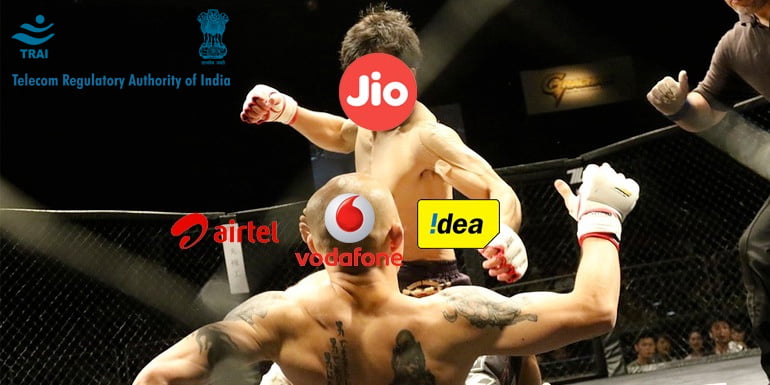Updated at September 20, 2017:
It seems incumbent telecom operator are already responding to TRAI’s decision. They say the new regulation will further add burden to their financial and will only help the new entrant.
“We are disappointed with this decision and are now considering our options in response to it. The Indian telecoms industry is already experiencing the greatest period of financial stress in its history. This is yet another retrograde regulatory measure that will significantly benefit the new entrant alone while adversely affecting the rest of the industry as a whole. Unless mitigated, this decision will have serious consequences for investment in rural coverage, undermining the Government’s vision of Digital India.” said an Official Spokesperson, Vodafone India.
“We are extremely disappointed with the latest regulation on the IUC, especially at a time when the industry is facing severe financial stress. The suggested IUC rate, which has been arrived at in a completely non-transparent fashion, benefits only one operator which enjoys a huge traffic asymmetry in its favour. The sharp drop in the IUC rate will only help transfer part of its cost to other operators, thereby further worsening the financial health of the industry. As part of an industry, which continues to be a critical driving force behind the economic growth in the country, we are genuinely dismayed by this decision.” said an official statement from Bharti Airtel.
Our original story from Wednesday, September 20, 2017, follows:
In a big win to Reliance Jio and a big loss to incumbent telecom operators in India, the Telecom Regulatory Authority of India (TRAI) has decided to cut down the mobile termination charges or interconnection usage charges (IUC) to more than half. The best part, the telecom watchdog will completely abolish the call termination charges to zero by the year 2020.
If you are new to the IUC, then its the fee paid by the telecom operator from whose subscribers originates the call, to the telecom operator in whose network the call terminates. For example, if you’re an Airtel mobile subscriber and makes a voice call to a friend having Idea Cellular connection, then Airtel has to pay a mobile termination charge (that’s now 6 paise per minute) to Idea Cellular for the entire duration of the call. Till now, these charges are a major part of the revenue for telecom operators.

TRAI has today issued a regulation on domestic termination charges. Under the new regulation mobile to mobile termination charges have been reduced from 14 paisa per minute to 6 paisa per minute. The new pricing will come into effect starting 1st October 2017. The biggest benefit of this would be the lowering of voice tariff. In addition, the regulator has also decided to bring down the termination charge for all types of domestic calls to zero from 1st January 2020.
TRAI reduced IUC charges
- TRAI reduced IUC charges from 14 paisa per minute to 6 paisa per minute.
- The new IUC charges will come into effect from 1st October 2017.
- The regulator plans to completely abolish the termination charges by 1st January 2020.
- Mobile subscribers will directly get the benefits as it will bring down the tariffs.
- The termination charges for other types of calls (such as wireline to mobile, wire-line to wireline
and wire-line to mobile) would continue to remain zero.
The new decision is said to be a bigger blow to incumbent telcos like Airtel, Vodafone and Idea Cellular. This telco’s were demanding an increase in the mobile termination charges to all way up to 40 paise per minute. However, the new entrant in the Indian telecom space, Reliance Jio demanded to abolish the termination charges to zero.


